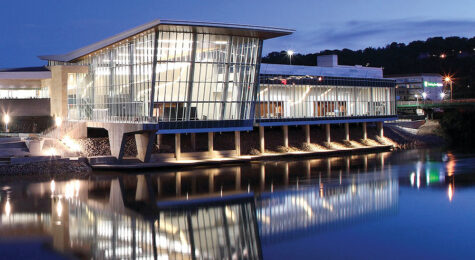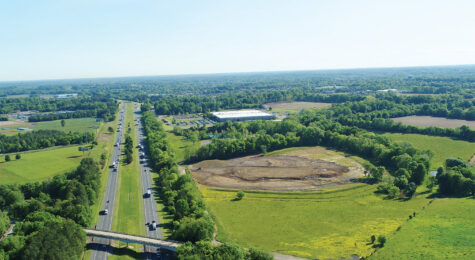Moving to a New City? Meet the People, Programs and Organizations Working Hard to Help Get You There
Your new city is ready to roll out the red carpet for you. You just have to know who to ask.

So you’re thinking about moving to a new city? That’s exciting! You’re probably thinking about things like finding a new apartment, a new job and a new friend group. You’re wondering about broadband access, cost of living, commute times, co-working spaces and how to discover the cool places that will become your go-to hangout spots.
What most people don’t think about, because they don’t know, is just how many people and organizations are working hard behind the scenes to help get you excited about your new city, assist you with your move, connect you with opportunities there, and plug you into the community in practical, meaningful ways – all at no cost to you.
Yes. Really.
Especially now, with more people than ever leaving major cities, small and mid-size cities are competing to attract new residents just like you. And from the chamber of commerce to the local economic development group to relocation incentive programs, your new city is ready to roll out the red carpet for you. You just have to know who to ask.
Here’s an overview of some valuable (and free to you!) resources that are available in almost every city – who they are, how they can help, and how you can access them before, during and after you make your big move.
In This Article
What Do Chambers of Commerce Actually Do?
Chambers of Commerce have been around since, like, forever. But if you stopped 10 people on the street and asked them what a chamber does, chances are most of them would say something along the lines of, “Aren’t they the ones who bring those big scissors to ribbon cuttings?”
Most people have no idea how integral chambers are to the community – and the work they do to help attract new residents to their city and make them feel at home.
The truth is chambers have been around so long because they serve an essential purpose: providing connection. Many chambers offer specific programs for new residents, including relocation packets, community calendars and networking events.
“Chambers have so many great community connections,” says Amanda Ellis, marketing and communications manager for the Chattanooga Area Chamber of Commerce. “They’re structured differently depending on the community, so the resources and support you’ll find might be different depending on where you are, but I promise they’ll be helpful. In addition to many regular networking and volunteer opportunities, our Chattanooga Chamber has a Chattanewbies group to support new residents with getting settled, and we recently created a website for talent attraction and resources for people new to or interested in our area called Chattanooga Calling.”
Chambers are also staffed by the most helpful people on the planet. If you’re thinking about moving to a new city, call the local chamber, and they’ll do everything in their power to be sure you’re well-equipped to make the move.
“Most people who work at chambers genuinely love their community and love nothing more than to entice others to love it just as much,” says Ellis.
Need some practical help or recommendations? A chamber can connect you with a realtor to help you move, a barber to get a slick fade, and a fantastic restaurant to have a great meal. And once you’re settled, they have weekly networking events to help you meet new people and make new friends.
“Chambers are catalysts and serve our communities,” says Katy Brooks, CEO and president of the Bend Chamber of Commerce. “We bring people together to solve problems and create opportunities.”
What Is an Economic Development Organization and How Can They Help You?
Often in partnership with chambers, Economic Development Organizations (EDOs) serve a slightly different function in the world of newcomer attraction and retention. Their main motive is to help local companies thrive and expand by making sure the talent pool is rich. And guess what? The talent they need is you.
“Economic Development Organizations are a little like the Barney Stinson of a community – nobody really knows what they do, but they’ve got style and charisma and are great for attracting people,” says Becca Cruger, workforce development manager at the Grand Forks Region Economic Development Corporation. “Yes, we help businesses grow and expand, but the ultimate benefit is to the people who live in our community. People are why we do the work we do.”
EDOs help companies recruit out-of-town candidates and facilitate area tours for potential employees. Coming with a job or working remotely? They’re still excited to welcome you. Often, the EDO supports or sponsors the local co-working space and can get you set up with a membership if that’s what you need. EDOs are also often the ones creating content to help prospective residents understand exactly what it’s like to live there.
Cruger, for example, helped spearhead a talent recruitment and retention initiative called Greater Grand Forks: Way Cooler than You Think! “We set up a one-stop website and social media accounts to share all the cool things about our community with potential and new residents – information about schools, housing, nightlife, volunteer opportunities – you name it and we’ve probably got a page for it.”
If you search “Moving to [name of your city],” you’ll often find a relocation website created or supported by the local EDO. Want to make a personal connection? Take a look at your new city’s EDO website. Find the “Director of Talent” or “Director of Workforce” for your new city’s EDO. That person’s main goal is growing the local talent pool, which means they will do everything they can to help connect you with info and opportunities. They’ll know about all the programs in place to support your relocation (because they probably run many of them!) and might even be able to connect you with a local resident to give you more insights and recommendations (more on that later).
“There is nothing like helping a new resident see the magic of your region in the same way you do,” says Cruger. “My favorite part of the work I do is interacting with someone again two or three years after they’ve made their move. If I’ve done my job right, they have a growing friend base and have learned about things that fulfill them outside of the 9-5.”
What About Resources for Tourists? Can They Help New Residents?
Another place you should check into when considering a move to a new city is the local Destination Marketing Organization (DMO) or Convention and Visitors Bureau (CVB). These organizations are responsible for marketing the city or region to visitors. Which means they always know the best places to stay and dine and check out while you’re making your first trip.
“CVBs are the area experts on the amenities a community offers that contribute to quality of life,” says Terri Reifsteck, vice president of marketing & community engagement for Visit Champaign County. “While employers expertly share their own story to potential talent, they often don’t have the resources or expertise to speak to one of the most critical factors for people looking to relocate, which is what life will look like outside of work.”
If you like to bike, ask the CVB for a trail map. If you’re a foodie, they probably have a slick dining guide. They want your first visit to be memorable, so they’ll do everything they can to roll out the red carpet. “We believe that our newest residents are our best ambassadors, so we want to start them off on the right foot from the moment they enter our community,” says Reifsteck.
Reifsteck adds that CVBs are a great resource for information and inspiration potential residents can access before, during and after their visit. “CVBs have curated endless amounts of content that is helpful to visitors and residents alike. From blog posts, top ten lists of activities, videos, photos, events, CVBs have their pulse on it all. Even if you’re a resident, you should follow your area CVB on social media. You’ll learn more about your community and find yourself more engaged in local businesses and events.”
The other thing that is so cool about these groups – Chambers, EDOs and CVBs – is that they work really well together. They strive to make their city a better place to visit, live and work, so even though their specific focuses may be slightly different, they share a goal. They’ll all want to help.
“Broadly speaking, CVBs are connectors, so even if they don’t have the answer, they know how to find it,” says Reifsteck.
Community Concierge Programs Can Help Get You Connected
Some cities offer personalized programs to help welcome new residents, which are often called a concierge program. These programs were developed to help out-of-towners – like you! – quickly learn about the community and make connections. They want to engage with you, so you, in turn, engage with the city and all it has to offer. That way, in six months, you’re not still feeling like a newcomer who doesn’t know anybody.
These programs are usually made up of local volunteers that I call “super connectors.” These people are in love with their city. So in love, in fact, that they want to tell you all about it and make you love it too, and they’ll go to great lengths to make that happen.
Take Greater Louisville Inc.’s City Champs Program, for example. You can reach out to one of the City Champs (AKA a local who has volunteered to chat with new residents) to learn about your shared interests: live music, youth sports, elementary schools, local breweries, etc. You can connect with them directly through email or social media and learn more.
“Questions like, ‘What neighborhood should I move into?’ or ‘How do I get my kids enrolled in school?’ are much easier to navigate when you have the help of a City Champ,” says Christine Tarquinio, vice president of talent, workforce & brand strategies for Greater Louisville Inc. “In addition to feeling welcomed and getting good and accurate information, residents who contact City Champs also make connections and develop friendships.”
Another program I love is called Text A Detroiter. This will give you the same access to a local ambassador through text. And rest assured, these volunteers want to hear from you.
In Indianapolis, you can connect with an Indyfluencer who shares your interests to learn more about what it’s really like living there. Joe Pellman, executive director of regional image marketing for the Indy Chamber, explains what makes a program like this so meaningful to new residents:
“As an introvert, the thought of walking into a party where I don’t know anyone makes my palms sweat. But the entire dynamic shifts when a friend walks in a few minutes after I arrive. This is why the Indyfluencer program is so valuable: rather than make life-altering decisions on your own; locals are willing to come alongside you to answer questions and decrease the awkwardness of adapting to a new environment.”
Information is one thing; personal connection is another, says Pellman. “We could fill LifeInIndy.com chock-full of useful information and interesting stories about the Indianapolis region, but when it comes time for a prospective resident to make their decision, there’s nothing more powerful than a one-on-one connection.
Finally, a group called Wingman launched in Iowa City and will get you connected in a very personal way. Their motto is that it’s “Easy as 1-2-3,” which means that they’ll have ONE in-person (or virtual) meeting, invite you to TWO community or networking events, and connect you with THREE other locals so you can help build your new network.
All of these programs are free to access and go a long way toward making you feel rooted and welcomed in your new community. And there are more concierge programs like this popping up all over the country all the time.
Check Out Relocation Incentive Programs That May Be Available
Who knows, the city you’re considering – or maybe even one that’s not yet on your radar – may be offering cash incentives to move there. These rose to popularity a few years back with the launch of Tulsa Remote, a program to attract remote workers to Tulsa in an attempt to grow its population. Others have since popped up in many places; the most recent one to grab headlines is called Ascend West Virginia, which is offering new residents up to $12,000 in cash and relocation expenses.
Take these incentive programs seriously, and not just because of the money. These places are telling you that they are not just interested in attracting new residents; they are investing in getting new people there. Even if you’re not among the chosen few who receive an incentive check, you can count on these cities to support your relocation process and quality of life once you get there. Remember: your success is their success, and they’re excited to help.



